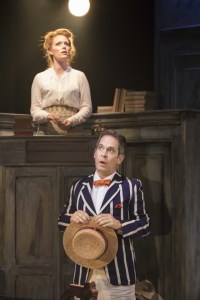Review: Travesties (Menier Chocolate Factory)
Tom Hollander stars in this revival production of Tom Stoppard’s play
What a pleasure it is to spend two hours or so in the company of Tom Stoppard. It’s a surprisingly rare treat. Despite being regularly described as Britain’s greatest living playwright the now-nearly 80 year-old is neither prolific nor populist enough to guarantee his works a regular place on our stages.
Which possibly explains why Travesties, premiered in 1974, was last seen in London more than 20 years ago. But now it is here, in a scintillating production directed by the playwright Patrick Marber and starring Tom Hollander, it is a moment to treasure – it’s like vintage champagne, rich and effervescent at first sip, with a mellow, lingering aftertaste of deeper tones.
The play’s a thrilling mix of fact and fiction, based on the odd but true historical footnote that the novelist James Joyce (in the midst of writing Ulysses) was in Zurich around 1917 at more or less the same time as Lenin (plotting revolution) and the Dadaist founder Tristan Tzara (working on his manifesto of anti-art). Also there was a minor minion in the British consular service, one Henry Carr, who starred in a performance of Wilde’s The Importance of Being Earnest directed by Joyce, and became involved in a dispute with him over the cost of a pair of trousers.
From this starting point, Stoppard fashions a fantasy refracted through the addled late-life reflections of Carr, looking back on the time through the haze of his fading memory. The result is much more free and less realistic in form than much of Stoppard, full of delicious relish in its own whirring invention.
On Tim Hatley’s surreal yet substantial paper-strewn set, scenes replay in different forms, as ideas pop into Carr’s mind – "constant digression being the saving grace of senile reminiscence." Joyce arrives and prompts a scene written entirely as a limerick. In another, Cecily, the excitable librarian, translates from the Russian as Lenin and his wife hear news of the revolution; in another Cecily and Gwendolen (Henry’s sister and Joyce’s amanuensis) replay a scene from Wilde in semi-song but with Tzara the object of their affections, and the subject being the Bolshevik theory of class. Wildean aphorisms abound, as do some really good – and often quite silly – jokes, including one about Joyce’s girlish name.
But beneath the breathtaking brilliance, deeper themes emerge, most importantly about the meaning of life and art, seen in the shadow of the Great War. Is all art as Tzara proclaims meaningless, a product of pure chance, a word that can mean whatever you want it to mean, like patriotism and duty? Does it exist for the sake of the party, as Lenin argues – or as social commentary which is radical Cecily’s view? Or is the artist, as Joyce contends, "the magician put among men to gratify – capriciously – their urge for immortality." After saying that, he produces a white rabbit from his hat, which is a clue to where the playwright’s sympathies lie.
All of these questions matter because as Carr, who was injured on the front, knows only too well the very nature of civilisation is at stake as these men sit out the fighting in Zurich – "the still centre of the wheel of war." As Carr, Hollander is superb, bemused and charming, fussing about his clothes, worrying about his status. But he finds amidst the confusion the melancholy terror of a man who has been in the trenches, and a sense of steel, of someone fighting for his values.
He’s surrounded by a first-rate cast, most notably Freddie Fox as Tzara, given to climbing stairs and scattering words of torn up poetry, Peter McDonald as a dignified Joyce, a ballad never far from his lips and Tim Wallers as the forceful Bennett, Carr’s servant with radical tendencies. Clare Foster as Cecily and Amy Morgan as Gwendolen, lend their imaginary characters great force whether dancing on tables or sparring across them.
Marber, who says that Travesties was the play which made him love theatre, directs with love and care, making sure the emotional notes sound deep beneath the frenetic farce. My friend Charles Spencer, the Telegraph‘s former theatre critic, once said wisely that Stoppard at his best leaves the audience feeling clever. That is exactly the effect here. The crackling intelligence is infectious; you leave the theatre aflame with ideas, and a glow of warmth at just what a wonderful time you have had.
Travesties runs at the Menier Chocolate Factory until 19 November.













